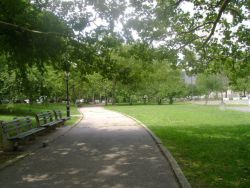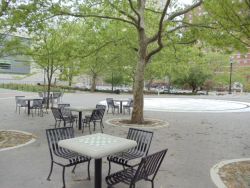Walt Whitman Park
Walt Whitman Park
"A great city is that which has the greatest men and women,
If it be a few ragged huts it is still the greatest city in the whole world."
This park honors Walt Whitman (1819-1892), poet, journalist, and native New Yorker. Whitman’s vision of an optimistic and self-reliant America surpassed traditional Victorian boundaries and influenced later free thinkers, including Ralph Waldo Emerson (1803-1882) and Oscar Wilde (1854-1900).
Walt Whitman was born in Huntington, Long Island, where he lived with his family until 1823. Unable to support his household on a carpenter’s salary, Whitman’s father moved the family to the City of Brooklyn, where he enrolled his son in a local grammar school. Although souring economics forced the Whitmans to return to Long Island in 1833, young Walt stayed behind and took work as a printer’s apprentice, his first foray into the world of words.
On his own at age 15, Whitman embraced the seedy decadence of 19th century Manhattan. Attending operas, observing street life, and working as a journalist, he developed an appreciation for the robustness of the city that matched his zeal for nature. Whitman returned to the bucolic life in 1836 by moving back to Long Island. There he farmed, taught school, and eventually founded The Long Islander. Although he sold the paper after only one year, this journalistic stint led to an eleven-year period of editorial work in Long Island, Brooklyn, and New Orleans.
It was not until 1855, however, that the man often referred to as “America’s Poet” found his literary voice. During the spring of that year, Whitman published the first edition of Leaves of Grass, a small volume of twelve untitled poems. His use of free verse and celebration of the common man shocked many of his contemporaries, who were embroiled in a Victorian consciousness that saw laborers and countryside as lowbrow or, in some cases, vulgar. It was only the enthusiastic support of Ralph Waldo Emerson that assured the success of later editions of Leaves of Grass. By 1892 there would be nine editions of the collection. Leaves of Grass celebrated individuality, democracy, nature, and a hardy embracing of life, and Whitman’s commitment to these ideals did not end on the printed page. He also served as a volunteer nurse to the sick and wounded in the army hospitals of Washington, D.C. during the Civil War (1861-1864), making over 600 hospital visits during this time. He campaigned for better parks, housing, schools, and water supply, and he was a leader in the fight against the extension of slavery into the new states of the West.
After 11 years in Washington, D.C., Whitman settled in Camden, New Jersey in a clapboard house he fondly referred to as “the shanty.” Here he revised manuscripts, wrote poetry, and entertained literary figures from various points of the globe. The final edition of Leaves of Grass appeared in 1892, the year of his death. Whitman rests in Harleigh Cemetery in Camden, New Jersey, in a tomb that he designed.
The City acquired this land in 1945 and transferred title to Parks by Local Law #109 of 1954. That same year, another local law named the park for Walt Whitman in honor of the centennial publication of Leaves of Grass.
Check out your park's Vital Signs
Clean & Safe
Green & Resilient
Empowered & Engaged Users
Share your feedback or learn more about how this park is part of a
Vital Park System




